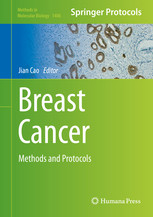

Most ebook files are in PDF format, so you can easily read them using various software such as Foxit Reader or directly on the Google Chrome browser.
Some ebook files are released by publishers in other formats such as .awz, .mobi, .epub, .fb2, etc. You may need to install specific software to read these formats on mobile/PC, such as Calibre.
Please read the tutorial at this link: https://ebookbell.com/faq
We offer FREE conversion to the popular formats you request; however, this may take some time. Therefore, right after payment, please email us, and we will try to provide the service as quickly as possible.
For some exceptional file formats or broken links (if any), please refrain from opening any disputes. Instead, email us first, and we will try to assist within a maximum of 6 hours.
EbookBell Team

4.0
56 reviewsThis volume provides resources, ideas, and bench manuals for the study of breast cancer. This book is divided into five sections: methods used in clinical laboratory for diagnosis (Detection of Molecular Markers of Breast Cancer); methods used in both clinical and research laboratories for testing genetic alterations (Genetic Detection of Breast Cancer) and (Isolation of Breast Cancer Cells); methods used to study the behavior of breast cancer cells (In Vitro Experimental Assays for Breast Cancer); and methods used for mimicking human breast cancer in a living organism (In Vivo Experimental Models for Breast Cancer). Breast Cancer: Methods and Protocols also explores several recently developed techniques for the study of breast cancer progression. Written in the highly successful Methods in Molecular Biology series format, chapters include introductions to their respective topics, lists of the necessary materials and reagents, step-by-step, readily reproducible laboratory protocols, and tips on troubleshooting and avoiding known pitfalls.
Practical and thorough, BreastCancer: Methods and Protocols, is a valuable handbook for both graduate and advanced undergraduate students of biological sciences, as well as scientists, technicians, and physicians working in the academic, hospital, or pharmaceutical industry aimed at studying or diagnosing breast cancer.